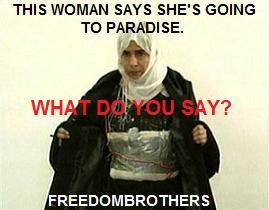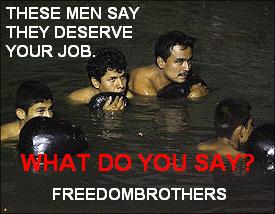Five years ago today, the United States Military was killing its way across the Southern Iraqi countryside, well on its way to delivering Liberties and Luxuries even the dream of which would have previously earned one of that nation's citizens a hardcore torture session in one of Uday Hussein's dungeons. Now, they fear no more. In the wake of Our President George W. Bush's total victory over his nemesis Saddam, the formation of the non-sectarian Iraqi Government, the Free Democratic elections, and now The Surge, Iraqis - whether they live in the rugged mountains of Kurdistan or the sun-scorched badlands of the Arabian desert - are loving life and the Freedoms generously bestowed upon them by America.
President Bush celebrated Iraq’s fifth Independence Day with thousands of jubilant warriors at America’s military citadel, The Pentagon. He declared that, “The successes we are seeing in Iraq are undeniable! The surge has done more than turn the situation in Iraq around, it has opened the door to a major strategic victory in the broader war on terror.” He added that “the level of violence is significantly down, civilian deaths are down, sectarian killings are down, [and] attacks on American forces are down." The Troops cheered. President Bush was only able to calm them by promising that they’d be allowed back to the front lines as soon as possible, where they could continue their fight against The Enemy.
The situation in Washington differed starkly from that in Fayetteville, N.C, where Barack Hussein mentally defecated on the more than 1,000,000 men and women who have died for their country since it won its own Independence 231 1/2 years earlier. "Nearly 4,000 Americans have given their lives” for absolutely nothing, he told the small group of fringe leftists that gathered for his hate rally. He added, “We are less safe and less able to shape events abroad. We are divided at home and our alliances around the world have been strained."
Whether or not America’s relationships with Barack’s namesake Saddam, little man, fat man, or Kim Jong-Il – even under the Clinton regime – could be characterized as “alliances" is subject to some debate, but in any event, if the “straining” of them is a bad thing, then The Grizz is Rupaul.
This disparity just highlights why it is so important for Americans to vote for War Hero and Future-President John McCain in the landslide victory he will achieve in November. If Barack Hussein or Bill Clinton's Wife somehow manage to infiltrate the White House, it may be the Iraqis coming to our aid next time around.









8 comments:
Hi there, do you have time for intelligent debate or do you prefer to spew hatred and evil?
are you interested in facts or are content with delusions?
Abu Jihad,
First of all, thank you for your comment. Your Right to speak your mind is your foremost Freedom as an American.
Second of all, if you don't agree with The Grizz's opinions, you obviously shouldn't be lecturing anyone on the facts.
Facts are what we deal in here at the Freedom Brothers. Read 'em and weep.
Fly High,
The Grizz
ok, fair enough
lets take a simple fact
before you can speak on this "clash" we must go back to the basics.
do you agree that MOST of us did not choose our religion but most likely took the religion we were born into, just as we did not choose our race, parents, country, language, or pretty much anything else.
think of this, the two most important and obvious things in your life that if were taken will result in your death. your heart to stop pumping, and your lungs to stop working. and we are in control of neither! so would you say us being in "control" is real or illusionary?
Facts are what we deal in here at the Freedom Brothers. Read 'em and weep.
Touché, douchebag:
When US forces ousted Saddam's regime from the south in early April 2003, the Badr Organization infiltrated from Iran to fill the void left by the Bush administration's failure to plan for security and governance in post-invasion Iraq.
In the months that followed, the US-run Coalition Provisional Authority (CPA) appointed Badr Organization leaders to key positions in Iraq's American-created army and police. At the same time, L. Paul Bremer's CPA appointed party officials from the Supreme Council for Islamic Revolution in Iraq (SCIRI) to be governors and serve on governorate councils throughout southern Iraq. SCIRI, recently renamed the Supreme Islamic Iraqi Council (SIIC), was founded at the Ayatollah Khomeini's direction in Tehran in 1982. The Badr Organization is the militia associated with SCIRI.
In the January 2005 elections, SCIRI became the most important component of Iraq's ruling Shiite coalition. In exchange for not taking the prime minister's slot, SCIRI won the right to name key ministers, including the minister of the interior. From that ministry, SCIRI placed Badr militiamen throughout Iraq's national police.
In short, George W. Bush had from the first facilitated the very event he warned would be a disastrous consequence of a US withdrawal from Iraq: the takeover of a large part of the country by an Iranian-backed militia. And while the President contrasts the promise of democracy in Iraq with the tyranny in Iran, there is now substantially more personal freedom in Iran than in southern Iraq.
Iran's role in Iraq is pervasive, but also subtle. When Iraq drafted its permanent constitution in 2005, the American ambassador energetically engaged in all parts of the process. But behind the scenes, the Iranian ambassador intervened to block provisions that Tehran did not like. As it happened, both the Americans and the Iranians wanted to strengthen Iraq's central government. While the Bush administration clung to the mirage of a single Iraqi people, Tehran worked to give its proxies, the pro-Iranian Iraqis it supported—by then established as the government of Iraq—as much power as possible. (Thanks to Kurdish obstinacy, neither the US nor Iran succeeded in its goal, but even now both the US and Iran want to see the central government strengthened.)
Since 2005, Iraq's Shiite-led government has concluded numerous economic, political, and military agreements with Iran. The most important would link the two countries' strategic oil reserves by building a pipeline from southern Iraq to Iran, while another commits Iran to providing extensive military assistance to the Iraqi government. According to a senior official in Iraq's Oil Ministry, smugglers divert at least 150,000 barrels of Iraq's daily oil exports through Iran, a figure that approaches 10 percent of Iraq's production. Iran has yet to provide the military support it promised to the Iraqi army. With the US supplying 160,000 troops and hundreds of billions of dollars to support a pro-Iranian Iraqi government, Iran has no reason to invest its own resources.
Of all the unintended consequences of the Iraq war, Iran's strategic victory is the most far-reaching. In establishing the border between the Ottoman Empire and the Persian Empire in 1639, the Treaty of Qasr-i-Shirin demarcated the boundary between Sunni-ruled lands and Shiite-ruled lands. For eight years of brutal warfare in the 1980s, Iran tried to breach that line but could not. (At the time, the Reagan administration supported Saddam Hussein precisely because it feared the strategic consequences of an Iraq dominated by Iran's allies.) The 2003 US invasion of Iraq accomplished what Khomeini's army could not. Today, the Shiite-controlled lands extend to the borders of Kuwait and Saudi Arabia. Bahrain, a Persian Gulf kingdom with a Shiite majority and a Sunni monarch, is most affected by these developments; but so is Saudi Arabia's Eastern Province, which is home to most of the kingdom's Shiites. (They may even be a majority in the province but this is unknown as Saudi Arabia has not dared to conduct a census.) The US Navy has its most important Persian Gulf base in Bahrain while most of Saudi Arabia's oil is under the Eastern Province.
America's Iraq quagmire has given new life to Iran's Syrian ally, Bashir Assad. In 2003, the Syrian Baathist regime seemed an anachronism unable to survive the region's political and economic changes. Today, Assad appears firmly in control, having even recovered from the opprobrium of having his regime caught red-handed in the assassination of former Leb-anese Prime Minister Rafik Hariri. In Lebanon, Hezbollah enjoys greatly enhanced stature for having held off the Israelis in the 2006 war. As Hezbollah's sponsor and source of arms, Iran now has an influence both in the Levant and in the Arab–Israeli conflict that it never before had.
The scale of the American miscalculation is striking. Before the Iraq war began, its neoconservative architects argued that conferring power on Iraq's Shiites would serve to undermine Iran because Iraq's Shiites, controlling the faith's two holiest cities, would, in the words of then Deputy Defense Secretary Paul Wolfowitz, be "an independent source of authority for the Shia religion emerging in a country that is democratic and pro-Western." Further, they argued, Iran could never dominate Iraq, because the Iraqi Shiites are Arabs and the Iranian Shiites Persian. It was a theory that, unfortunately, had no connection to reality.
Iran's bond with the Iraqi Shiites goes far beyond the support Iran gave Shiite leaders in their struggle with Saddam Hussein. Decades of oppression have made their religious identity more important to Iraqi Shiites than their Arab ethnic identity. (Also, many Iraqi Shiites have Turcoman, Persian, or Kurdish ancestors.) While Sunnis identify with the Arab world, Iraqi Shiites identify with the Shiite world, and for many this means Iran.
Grizz - There is a reason you will never teach in a university. Let me know when you find out.
By the way, meathead, the above FACTS weren't written by the central committee of the communist party or any ayatollah way out there in the Middle East.
The author was Peter W. Galbraith, a former US Ambassador to Croatia, is Senior Diplomatic Fellow at the Center for Arms Control and a principal at the Windham Resources Group, which has worked in Iraq.
More credentials than are likely possessed by your entire family including aunts and uncles.
Anonymous,
These are all completely uncorroborated allegations.
Fly High,
The Grizz
You are a shithead.
Anonymous,
Keep up the thoughtful criticism.
Fly High,
The Grizz
Post a Comment